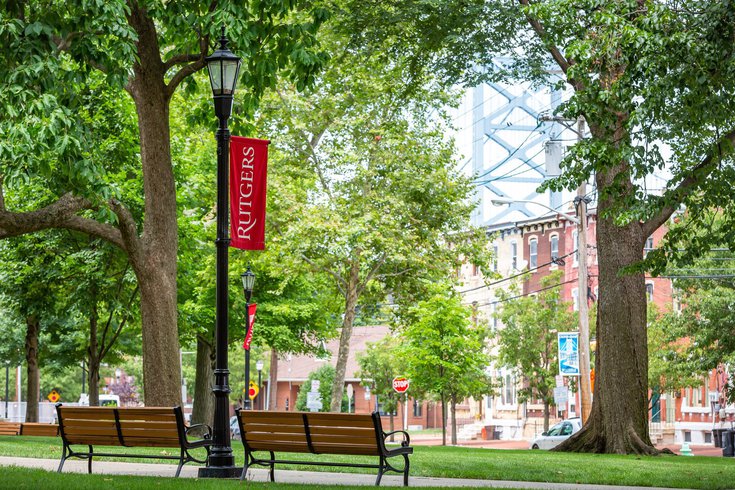
April 10, 2023
 Thom Carroll/For PhillyVoice
Thom Carroll/For PhillyVoice
More than 9,000 unionized faculty and graduate student workers at Rutgers University in Camden, Newark and New Brunswick have begun the first strike in the university's 257-year history.
More than 9,000 unionized faculty, staff and graduate students at Rutgers University are going on strike Monday after several months of stalled contract negotiations.
Three of Rutgers' 12 unions have called a strike at the university's campuses in Camden, New Brunswick and Newark, beginning at 9 a.m. The unions – Rutgers American Association of Professors-American Federation of Teachers, the Rutgers Adjunct Faculty Union and AAUP-Biomedical and Health Sciences of New Jersey – authorized a strike last month.
The unions have been seeking new four-year contracts that would be retroactive to July 2022. Though the unions and university have agreed on several issues, they remain divided on the unions' core demands, particularly pay increases for faculty members, part-time lecturers, postdoctoral fellows and graduate students.
The unions are demanding 5% salary increases for full-time workers in the first year, subsequent increases and cost of living adjustments. They also want the minimum salary for graduate students to increase by 37.6% over four years and the minimum salary for postdoctoral fellows to jump to $69,000, with 5% increases each year.
The university has offered a 12% across-the-board salary increase for full-time faculty by 2025, a 20% increase to the per-credit salary rate for part-time lecturers and a 20% minimum salary increase for postdoctoral fellows over the next four years. Similar proposals have been offered to graduate workers, Rutgers University President Jonathan Holloway said in a message to the university community.
For the first time in the history of Rutgers University, all three faculty, grad, EOF, and postdoc unions have voted to go on strike. Monday morning, we are ON STRIKE. See you on the picket line. #RUOnStrike pic.twitter.com/APMdFHgpvs
— Rutgers AAUP-AFT Academic Worker Union (@ruaaup) April 10, 2023
The unions also are seeking full finding for graduate workers, equal pay for adjunct faculty, greater job security and a path to tenure for staff and librarians, faculty control over teaching and research and enhanced supports for parents and caregivers. They wish to combine the unions into one collective bargaining unit, too.
The unions are comprised of adjunct instructors, full-time faculty, graduate workers, postdoctoral associates and health science faculty. The university's health science clinicians will continue to do patient care and research but will not do volunteer work for the duration of the strike, the Inquirer reported.
"We have bargained, and bargained, and bargained, and bargained, and bargained and we are not getting anywhere and need to do something more," Rebecca Givan, AAUP-AFT president, said during a town hall Sunday night.
The strike is the first in the university's 257-year history. It is expected to impact the majority of classes as students head into the final weeks of the academic year and prepare for commencement. Unionized workers will picket at the three campuses Monday and provide updates on social media.
"We have all been hard at work trying to resolve issues around compensation, benefits, and other terms and conditions of employment," Holloway said in a message to the Rutgers community. "Significant and substantial progress has been made, as I have noted, and I believe there are only a few outstanding issues. We will, of course, negotiate for as long as it takes to reach agreements and will not engage in personal attacks or misinformation."
Holloway has said he believes that the strike is illegal because public employees in New Jersey are unable to strike. The strike is characterized as illegal on a question-and-answer section of the university's website, and Holloway has hinted that the university may go to court to seek an injunction that would "compel a return to normal activities."
Holloway first hinted at possible court action in a message to the campus community in March, which drew backlash from the unions. At the time, labor and social justice scholars penned an open letter asking Holloway to rescind the university's "threat to use the power of injunction to punish, fine, and arrest workers taking job actions."
"You have the opportunity to provide the kind of leadership that we need in this moment — leadership that fights for public education and for a fair and just workplace," the letter read. "Rutgers workers have labored for more than eight months without a contract amidst spiraling inflation and a global pandemic."
The AAUP-AFT and Rutgers Adjunct Faculty Union have stipulated that there is no state law barring public-sector employees from striking in New Jersey, and that public employees have gone on strike 36 times in the past 30 years. In some cases, one of which Holloway cites on the university's website, courts have issued injunctions against striking employees.
After the three Rutgers University unions declared a strike, Gov. Phil Murphy released a statement asking both bargaining committees to meet with him to discuss next steps and try to come to a solution to end the work stoppage by the end of the semester on May 14.
"Rutgers University is one of the nation's premier institutions of higher learning," Murphy said. "I am calling the university and union bargaining committees to meet in my office tomorrow and have a productive dialogue. The world-class educators, students, and staff of Rutgers University have my word that these parties will negotiate in good faith to reach an agreement that is fair for all parties."
The strike comes amid a trend of labor movements on college campuses. Earlier this year, Temple University's graduate student union went on strike for 42 days to secure guaranteed pay increases and a partial subsidy for dependent health care, a first in the union's 20-year history.
Jim Brown, president of of the Rutgers-Camden chapter of the AAUP-AFT union, told the Inquirer that the union "never wanted to be in that position," but that workers knew it was a possibility and organized in preparation for a potential work stoppage.
According to a banner on Rutgers' website, all three campuses are open and operating on regular class schedules. The university created a landing page for information about labor negotiations and how to ensure that students continue to receive grades and have access to campus resources.
Students have been instructed to check their Canvas accounts to find information from their instructors to make sure that they are continuing to complete work on time. The university noted on its website that its "top priority" is the academic progress of its more than 67,000 students.